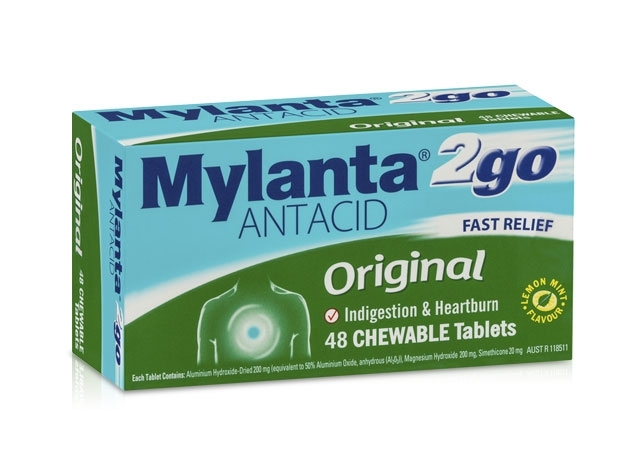Mylanta is an over-the-counter (OTC) antacid medication that is used to treat heartburn, indigestion, and upset stomach. It is available in both liquid and tablet form, and can be taken with or without food. Mylanta is a safe and effective medication when used as directed.
How does Mylanta work?
Mylanta is an antacid that works by neutralizing stomach acid. It is available over the counter and does not require a prescription. Mylanta is used to treat heartburn, indigestion, and stomach upset. It is also used to treat symptoms of gastroesophageal reflux disease (GERD) and to help prevent Barrett’s esophagus. Mylanta is a combination of aluminum hydroxide and magnesium hydroxide. Aluminum hydroxide works by binding to stomach acid and neutralizing it. Magnesium hydroxide works by drawing water into the intestines, which helps to soften stool and relieve constipation.
What are the benefits of Mylanta?
There are many benefits of Mylanta. Some of the most notable benefits include:
1. Relief from heartburn and indigestion: Mylanta is an effective antacid that can provide relief from heartburn and indigestion. It works by neutralizing stomach acid and creating a barrier that protects the lining of the stomach and esophagus.
2. Fast-acting relief: Mylanta begins to work within minutes of taking it, making it one of the fastest-acting antacids available.
3. Long-lasting relief: Mylanta provides up to four hours of relief from heartburn and indigestion, making it one of the longest-lasting antacids as well.
4. Multi-symptom relief: Mylanta not only relieves heartburn and indigestion, but can also help to relieve gas, bloating, and nausea.
5. Safe for use: Mylanta is safe for use by most people, including pregnant and breastfeeding women. However, it is important to speak to a doctor before taking Mylanta if you have certain medical conditions, such as kidney disease or are taking certain medications.
What are the side effects of Mylanta?
Mylanta is an over-the-counter antacid medication that is used to treat heartburn and indigestion. It is a combination of aluminum hydroxide and magnesium hydroxide. Mylanta is available in liquid and tablet form.
The most common side effect of Mylanta is constipation. Other side effects include diarrhea, upset stomach, and bloating. Mylanta is generally well-tolerated. Serious side effects are rare.
If you experience any side effects while taking Mylanta, stop taking the medication and contact your doctor.
Who should not take Mylanta?
There are a few groups of people who should not take Mylanta. These include:
People with kidney disease: Mylanta can put extra strain on your kidneys, which can worsen kidney function.
People with liver disease: Mylanta can put extra strain on your liver, which can worsen liver function.
People with stomach ulcers: Mylanta can irritate your stomach, which can worsen ulcer symptoms.
People with allergies to aluminum or magnesium: Mylanta contains both of these ingredients, so if you’re allergic to either one, you should avoid Mylanta.
Pregnant or breastfeeding women: Mylanta hasn’t been studied in pregnant or breastfeeding women, so it’s not known if it’s safe for them to take.
How should Mylanta be taken?
Mylanta is an over-the-counter antacid medication that is used to treat heartburn, indigestion, and stomach upset. The active ingredient in Mylanta is magnesium hydroxide, which works by neutralizing stomach acid. Mylanta is available in liquid and tablet form.
Mylanta should be taken as needed, 15-30 minutes before meals or as directed by a healthcare provider. For best results, the liquid form of Mylanta should be taken with a full glass of water. The tablets should be chewed thoroughly before swallowing. Mylanta can be taken up to 4 times per day.
If you experience any side effects while taking Mylanta, such as diarrhea, constipation, or stomach pain, stop taking the medication and consult your healthcare provider.
What are the possible interactions with Mylanta?
There are many possible interactions with Mylanta. Some of these interactions can be beneficial, while others may cause adverse effects. It is important to be aware of all potential interactions when taking this medication.
Mylanta may interact with other medications, herbs, or vitamins you are taking. These interactions can alter the way your body metabolizes the drugs or increase the risk for serious side effects. To avoid these problems, be sure to discuss your medications and supplements with your healthcare provider.
Some of the most common medications that may interact with Mylanta include:
Antacids: Mylanta can decrease the absorption of other medications that are taken at the same time. If you are taking any medications that need to be absorbed into the bloodstream, be sure to take them at least two hours before or after taking Mylanta.
Blood thinners: Mylanta can increase the effects of blood thinners, such as warfarin (Coumadin). If you are taking a blood thinner, be sure to have your blood clotting monitored closely by your healthcare provider.
Calcium-containing products: Mylanta can bind with calcium in the intestine and prevent its absorption. If you are taking calcium supplements, be sure to take them at least two hours before or after taking Mylanta.
Iron supplements: Mylanta can bind with iron in the intestine and prevent its absorption. If you are taking iron supplements, be sure to take them at least two hours before or after taking Mylanta.
Lithium: Mylanta can increase the amount of lithium in the body. If you are taking lithium, be sure to have your lithium levels monitored closely by your healthcare provider.
Other antacids: Mylanta can bind with other antacids in the intestine and prevent their absorption. If you are taking other antacids, be sure to take them at least two hours before or after taking Mylanta.
What are the possible side effects of taking Mylanta?
Mylanta is a medication that is used to treat heartburn, indigestion, and other stomach related issues. While it is effective in treating these problems, there are some potential side effects that you should be aware of.
The most common side effect of Mylanta is diarrhea. This can be caused by the medication itself or by the interaction of Mylanta with other medications that you are taking. If you experience diarrhea, it is important to drink plenty of fluids to avoid dehydration.
Other potential side effects of Mylanta include constipation, headache, dizziness, and upset stomach. These side effects are typically mild and go away on their own. However, if you experience any of these side effects, it is important to contact your doctor.
In rare cases, Mylanta can cause more serious side effects. These side effects include allergic reactions, kidney problems, and liver problems. If you experience any of these side effects, it is important to seek medical attention immediately.
Overall, Mylanta is a safe and effective medication for treating heartburn, indigestion, and other stomach related issues. However, there are some potential side effects that you should be aware of. If you experience any of these side effects, it is important to contact your doctor.
Who should take Mylanta?
There are a variety of over-the-counter and prescription antacids available to neutralize stomach acid and relieve heartburn. Mylanta is one of the most popular antacids on the market. But who should take Mylanta?
Mylanta is safe for most people to take. However, there are a few people who should avoid taking Mylanta or any other antacid. These people include:
- People with kidney disease.
- People who are taking prescription medications for heart disease or high blood pressure.
- People who are taking prescription medications for osteoporosis.
- Pregnant women.
- Nursing mothers.
- Children under the age of 12.
If you have any of these conditions, or if you are taking any prescription medications, you should talk to your doctor before taking Mylanta or any other antacid.
In general, Mylanta is safe for most people to take. If you have heartburn or indigestion, Mylanta can help to relieve your symptoms.

